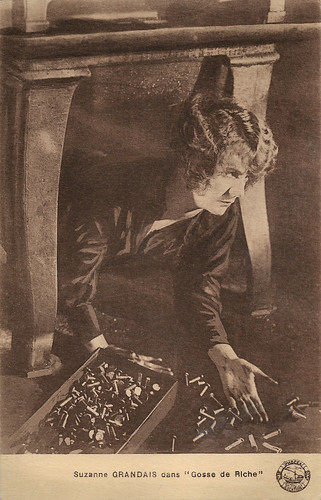The French silent film Gosse de riche/Rich Kid premiered on 27 August 1920. The day after, the star of the film, Suzanne Grandais, was killed. The car in which she was sitting with her director Charles Burguet, his wife, and the cameraman Marcel Ruette, had overturned after one wheel broke down, and a tire of another wheel exploded at the same time. Burguet and his wife were catapulted from the car and survived, but Ruette and Grandais were crushed by the car and died.

French postcard. Photo: Phocéa-Film. Suzanne Grandais in Gosse de riche/Rich Kid (Charles Burguet, 1920).

French postcard. Photo: Phocéa-Film. Suzanne Grandais in Gosse de riche/Rich Kid (Charles Burguet, 1920).

French postcard. Photo: Phocéa-Film. Suzanne Grandais in Gosse de riche/Rich Kid (Charles Burguet, 1920).

French postcard. Photo: Phocéa-Film. Suzanne Grandais in Gosse de riche/Rich Kid (Charles Burguet, 1920).
Class struggle
In Gosse de riche/Rich Kid, Suzy Maravon (Suzanne Grandais), the daughter of an industrialist (Henri Roussel), wants to know how life is for the workers in her fathers' factory.
So Suzy offers her services as an assistant at the workbench. By some rioters and an unfaithful foreman, Gonfaron (Camille Bardou), sabotage is committed, but with the help of another employee, Mougins (Henri Bosc), this is prevented.
Berthe Jalabert, always playing mothers in those years, here plays the mother of Mougins. As usual, the story ends well, with a marriage.
Around 1919-1920, many Western films were made about violent strikes or riots menacing the bourgeois elite - echoing the turmoils in Germany, and before in Russia.
Most films of these films end in reconciliation - either by force, by reason, or by wit - instead of class struggle.

French postcard, no. 12. Photo: Phocéa-Film. Suzanne Grandais in Gosse de riche/Rich Kid (Charles Burguet, 1920).

French postcard, no. 13. Photo: Phocéa-Film. Suzanne Grandais and Henry Roussel in Gosse de riche/Rich Kid (Charles Burguet, 1920).

Suzanne Grandais. Possibly a French postcard, but editor unknown.
Sources: Arnhemsche courant (Dutch - 27-11-1920), 1895 (French), Wikipedia and IMDb.

French postcard, no. 12. Photo: Phocéa-Film. Suzanne Grandais in Gosse de riche/Rich Kid (Charles Burguet, 1920).

French postcard, no. 13. Photo: Phocéa-Film. Suzanne Grandais and Henry Roussel in Gosse de riche/Rich Kid (Charles Burguet, 1920).

Suzanne Grandais. Possibly a French postcard, but editor unknown.
Sources: Arnhemsche courant (Dutch - 27-11-1920), 1895 (French), Wikipedia and IMDb.
No comments:
Post a Comment